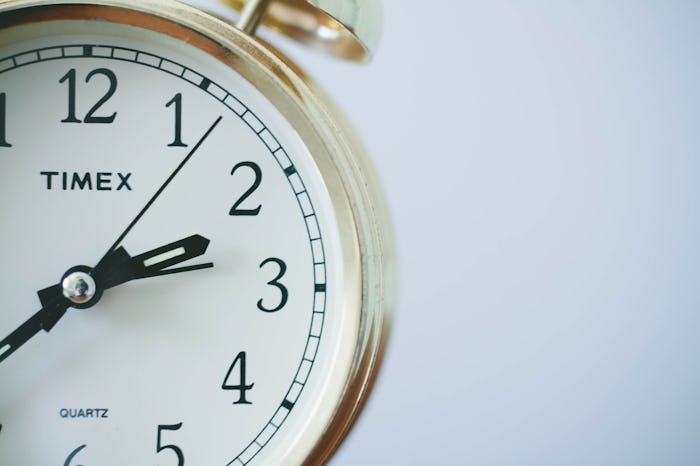Life
Here's How To Adjust Your Baby's Internal Alarm Clock When Daylight Saving Time Ends
Before you have kids, the fall time change means little more than a welcome extra hour of sleep. But once there's a child in the mix, all time changes are created equal and they can all wreak havoc on a baby or toddler's sleep schedule. Should you wake your baby up earlier when Daylight Saving Time ends? Experts agree that whatever changes you make to baby's schedule, it's best to do it gradually.
"I've been planning for the past month," Amelia Bailey, an OB-GYN and mother of two, tells me over the phone about her preparation for Sunday's time change. Bailey, a sleep research expert for mattress company Reverie, recommends delaying your child's nap time and bedtime by five minutes each day over a two-week period. If you want to take it slower, try two minutes a day for a month.
The goal isn't to achieve perfect synchronization with the end of Daylight Saving Time, but to spare your child a bigger and more abrupt change, which can lead to sleep regression and other issues. If you haven't started yet, it's not too late. Regardless of when you begin to tweak your baby's schedule, it's normal for the adjustment period to continue for a week or two after the time change.
When it comes to coping with the time change, "lighting helps," says Bailey. You may have noticed that your child is already rising later in the morning because it stays dark longer. And while it can be hard to get a toddler to go to bed at 7:30 on a light-filled summer night, the fall's earlier sunsets make bedtime less of a fight. Parents can manipulate lighting in their favor with tools such as blackout shades that help you control when and how much light your children are exposed to in their room.
As far as which part of the schedule is easier to change, Bailey says nap times are usually easier to push back incrementally than bedtimes. This is another reason why you may need to continue working on your child's adjustment to the end of DST after the clocks have fallen forward.
Age is another complicating factor in helping your child deal with the time change. Bailey finds that babies and toddlers between 6 and 24 months of age usually have more trouble adjusting than older children. This is because their schedules are already changing frequently. For example, a young toddler on the cusp of transitioning from two naps to one may suddenly make the jump, and you can't be sure if this evolved naturally or because of the time change. On the other hand, a 3 or 4-year-old who recently stopped napping may have trouble staying up for a later bedtime without becoming overtired.
Overall, adjusting to the time change will look slightly different for every family. For example, some parents may not mind an earlier rising child — it could give you extra time together in the morning before work. The most important thing is to ensure every member of the family is well rested. Bailey says she doesn't think American children are getting enough sleep these days. Tired children often exhibit behavioral issues during the day. Instead of keeping kids up too late or skipping naps, Bailey recommends that parents prioritize their kids' sleep schedules. Adults can also benefit from putting themselves on a regular nighttime and morning routine.
Finally, I asked Bailey for general sleep hygiene tips for the whole family. She says, "Keep a sleep schedule, turn the temperature down a little at night, use breathable, comfortable sheets and pajamas." These simple tips can help make nighttime better for everyone in your household, especially as you adjust to the end of Daylight Saving Time.
Check out Romper's new video series, Romper's Doula Diaries:
Check out the entire Romper's Doula Diaries series and other videos on Facebook and the Bustle app across Apple TV, Roku, and Amazon Fire TV.
